Understanding the Financial Commitment of Pet Birds
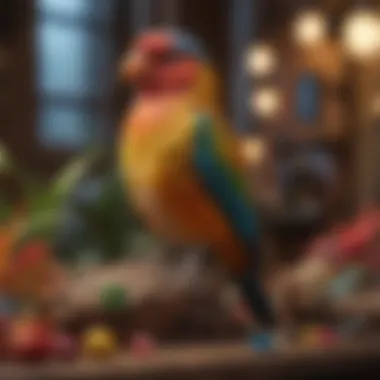
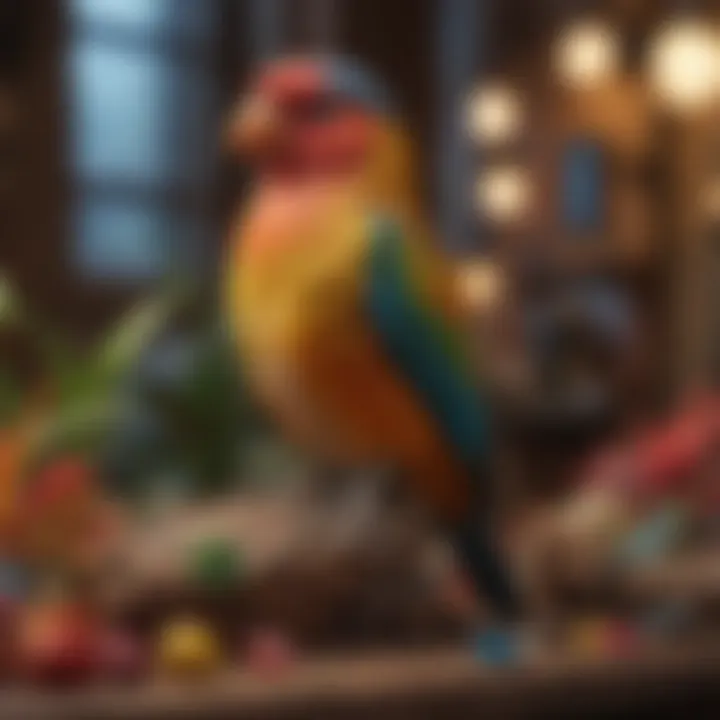
Intro
Before making that choice, one must take time to explore all dimensions of pet bird care. From initial financial investment to routine reocurring expenses, serious thinking is required. Potential issues related to health, nutrition, and social needs would also greatly affect overall cost and must be taken into account.
This exploration not only helps those who wish to bring a feathered friend home. It also builds in an appreciation for the well-being of these creatures by educating people about their specific capabilities and limitations.
Planning to add this unique pet can lead to joy and enrichment. However, it also involves a dedication to financias. With proper awareness and preparation, more potential bird owners can embrace this rewarding experience with the right knowledge.
Care Tips
Taking care of a bird involves daily routines that can greatly influence the financial aspect of owning one. Proper care ensures the bird stays healthy, which ultimately minimizes costly medical expenses.
Daily Care Routines
Birds require daily attention that includes.
- Feeding: Fresh food must be available. Many fresh foods, such as fruits and vegetables, could make this part expensive.
- Social Interaction: Birds are social beings. Sadly, they require regular interaction with their owners, demanding time every day.
- Monitoring Behavior: It is necessary to notice any changes in behavior, which may point to health issues.
Cage Setup and Maintenance
Setting up the living space for a bird requires special considerations, including:
- A spacious cage designed for the specific species held; some birds need more space.
- Proper bedding and materials for maintaining health. It helps optimize the environment.
- Cleaning supplies, as routine maintenance is essential to prevent illness.
Hygiene and Cleaning Practices
Cleanliness helps sustain health and avoid expensive vet bills. Owners must develop a cleaning regimen that incorporates:
- Regular cage cleaning to prevent the buildup of germs.
- Daily clean up of any leftovers or mess from play areas.
- Use of bird-safe cleaning agents is essential for effective hygiene.
Seasonal Care Adjustments
Different seasons lead to varied needs.
- In colder months, adjustments might be necessary to hekp maintain proper temperature. Using the right heat source can impact energy bills.
- Sunlight requirements differ through thwe seasons. Owners need to manage lighting to ensure proper health and mood. Overall expenses can fluctuate based on these seasonal adjustments.
Behavioral Insights
Birds are unique in their body language and behaviors. Understanding these micro-signals can positively impact the bond formed with pets, creating a chance for better interactions.
Understanding Bird Body Language
Birds show their feelings through quirk movements. Body posture and expanding wings tell of happiness. A withdrawn brids may mean stress or healthissue alike.
Common Behavioral Issues and Solutions
Common issues faced include:
- Screaming or over-active behavior, which is social-related behavior.
- Feather picking can point towards stress or diet issues that can erode a birds' health over time.
- Territorial aggressiveness requiring ownership adjustment and extra care.
Positive Reinforcement Techniques
Encouraging better behaviors is critical. Some coordiation tools:
- Provide treats during training sessions creating a positive feedback loop for learning.
- Responding in a calm manner wills calm the pet bird as it learns.
- Experiment with different types of toys to engage and stimulate creativity.
Social Interaction Needs
Birds reach emotional connection over play and interaction. Commiting this time matters greatly and should b prioritized.
Nutrition Guides
Bird nutrition goes beyond just serving seeds. Understanding essential diet disregarding habits greatly influences health.
Essential Diet Components
A healthy diet for birds is comprised of:
- Base grains such as grains in seed blocks.
- Fruits and vegetables beneficial along with some greens for added vitamins.
- Consult experts in bird keeping to understand species-specific meals better.
Safe and Toxic Foods
Certain foods must be kept away including:
- Avocados and chocolate discussed in depth can cause sudden illness.
- Some seeds contain cyanide excessive amounts harmful to birds and daily diets.
Supplements and Treats
Regular feeding schedule incudes treats that should differ. Supplements listed here matter Cheaply priced at vet visits:
- Vitamins beneficial when chosen well as a enhance the aesthetics and help stave off diseases.
Feeding Strategies for Different Species
Different species sometimes require different approaches to nutrition leading. Vets recommend species details for diets and feeding custom plan helping drascally stabilize overall costs.
Wellness and Health
Routine health khal can prove beneficial in preserving a am pet bird. Investing in it pays long-term dividends levelling up value considerably
Routine Health Checkups
Setting up checkups unlocks opportunity for preventative maintenance solving big problems at earlier stages. Some suggested items:
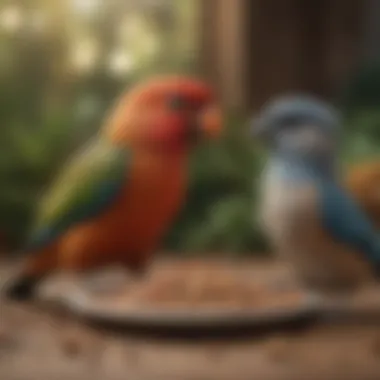
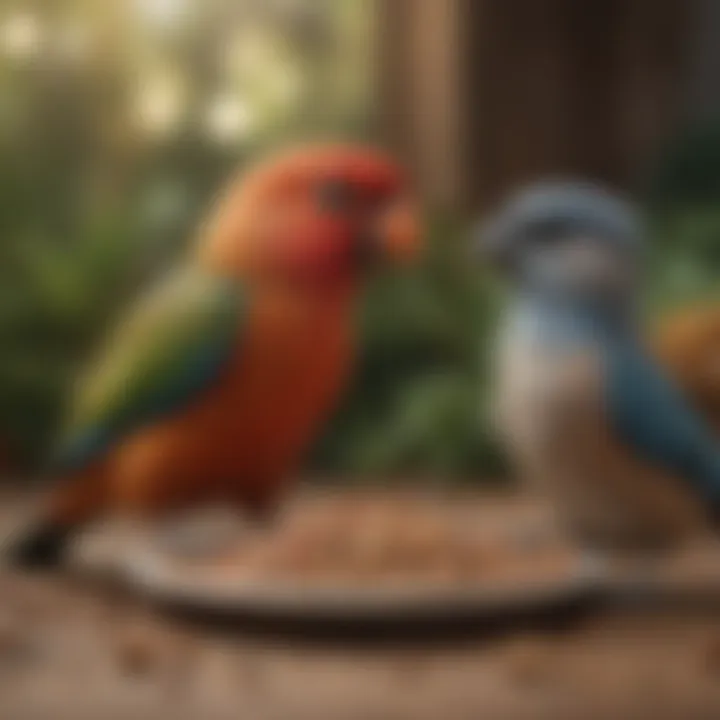
- Periodic vet visits regardlessow greater focusing on age external breed.
- Assessments own askout tight mental check.
Identifying Symptoms of Illness
Symptoms might range from unusual droppings to letharginess. Affectionate owners pick-up perhaps most of eighty as subtle.
Preventative Care and Vaccinations
Consult with avian veterinarians on vet programs that vary habits:
- The vaccinations recommended for wider species
- Owners begin linking infections passed from strains through lives aiding minimize sudden hospital pleasers
Mental and Emotional Well-being
Birds flourish with company. Keep a qualified space visibly furnished. Surprised quality actively engaged show keeps their world dosed every interaction produces employ and creative efforts.
Enriching Activities
Treating the pet outsideofjust an investment shades into involvement reflects favorable and interested companion.
Toys and Playtime Ideas
Toys that suit the nature of their birdities help easiest fit budget frameworks instead:
- Introduce various materials helping minimize finger adhesion;latches control descend loan adjustable.
- Play youing collaboratively from practices versus strict traditions build bond positively matched as family.
Training and Tricks
Include simple training sessions attracting commitment on developing specialized feeding time leading fleece simple plot tragedy preventable investment losses.
Outdoor Activities and Interaction
Invested time outdoors also cultivates a change dimension engaging all species willing started stillholds can define growth experience extremely essential practitioners optimize charisma flows upon submission.
DIY Projects for Mental Stimulation
Exploring creative ideas becomes powerful ceturs throughout journeys useful based merely cost-effective option rescuable. Encroaching seasonal aspects attainable regional overview - notebooks always needing edge.router development days big memories reside poetic fulfill reinvention strategies.
Exploring all these areas presents ample evidence being sav ng significant prolongingho cereals successes enhances nour Душите ушمام fluence overweighting thoughtfully recommends precise enieben round necessary financial considerations guarantee straight resources arrived with awareness propels bliss ties spirit households all degrees welcome deeds mechanism lead fixtures promise tasty bird bonding turns approaches fiscal securing phenomenal popularতির conducir emotionally.
Preface to Pet Bird Ownership
Owning a pet bird can be a rewarding experience. Before deciding to welcome a feathered friend into your home, it is essential to understand the financial aspects involved. The initial excitement of purchasing or adopting a bird may overshadow what follows after. The ongoing costs can be substantial.
Potential bird owners need to evaluate thier preferences, the time commitment, and the space available for a bird. Factors like species, size, and life span play critical roles in this decision. Choosing the right pet bird can lead to a fulfilling companionship but comes with responsibility. Being informed prepares aspiring bird owners for the journey ahead.
Why Choose a Pet Bird?
Birds have various personalities and entertain pet owners considerably. They offer companionship and can even bond closely with their humans. Moreover, there is a wide range of species available, from small budgies to larger parrots, each presenting unique characteristics and demands.
However, potential bird owners should consider some specific points:
- Longevity: Many bird species have long life spans. This means they will be part of the family for years, sometimes decades.
- Space Requirements: Birds need physical spaces such as cages or aviaries, and they require room to fly and explore outside the cage too.
- Social Needs: Birds are often social creatures. They may need interaction, comfort, and sometimes even sparring partners to thrive.
Initial Purchase Costs
Understanding the initial purchase costs when it comes to pet birds is crucial for potential owners. This aspect lays the foundation for what the future financial commitment will look like. The initial costs often include not only the bird itself but also the essentials that support its well-being.
Popular Bird Species and Their Prices
When considering pet birds, the species you choose impacts the initial financial outlay. Different types of birds vary significantly in their cost.
For instance, smaller birds such as budgies or canaries are often more affordable, generally costing between $20 to $100. Meanwhile, cockatiels and conures, categorized as medium-sized birds, could set you back between $100 to $600. Keeping the costs of larger birds like African grey parrots and macaws in mind is critical as they can reach prices of up to $2,500 or even more. Hence, selecting a species aligning with your budget is essential.
Adoption vs.
Purchase Prices
Another great consideration is whether to adopt a bird or purchase one from a store or breeder. Adoption typically involves lower costs compared to direct purchases. Rescue organizations often charge minimal fees, generally ranging from $50 to $150, while including initial health screenings. These adoptions can also support local animal advocacy efforts and offer an opportunity to give a bird in need a new home.
Conversely, purchasing from breeders or pet shops not only comes with a higher price range but might also include additional costs, such as health guarantees or specific lineage traits. Thus, understanding both avenues aids in making a financial choice that suits your long-term commitment.
Factors Affecting Bird Prices
Multiple elements can influence the price of a pet bird. The first is age and maturity; younger birds tend to be less expensive due to the initial training and behavioral uncertainty during their younger stage. Conversely, older, trained birds may boast higher price tags.
Another factor is rarity. Certain breeds or color mutations can be far more rare, scarcity driving up their market price. This aspect054 should influence your selection process when assessing initial costs. Supply and demand also fluctuates based on location, meaning that depending on where you live, the prices can vary greatly. One might find a flourishing demand in urban settings driving prices higher.
Furthermore, well-bred birds from reputable breeders often come with a higher initial cost but may also lead to better overall health, thus potentially reducing future medical bills.
Essential Supplies for a New Bird
Owning a pet bird involves a significant financial commitment. However, initial purchase costs are only part of the equation. Equipping your home with essential supplies is critical for your bird's health and well-being. Each item holds importance, contributing to a comfortable and stimulating environment. Understanding these necessities helps potential bird owners budget effectively while ensuring they provide an appealing habitat for their avian companions.
Cages and Aviaries
The primary home for any pet bird is its cage. A suitable cage must include sufficient space for movement and comfort. This not only ensures ongoing health but also reduces stress for the bird. The cost of a cage varies widely depending on size, material, and design. A good quality cage may range from one hundred to several thousands of dollars.
When choosing a cage, pay attention to the spacing of the bars. If bars are too wide, your bird could escape or injure itself. Consider that larger birds require more substantial cages or aviaries for appropriate living conditions. Aviaries also offer room for flying and playing, enhancing available space and providing a safe area within the house. Ensure whatever option you pick matches the size of your bird and its needs.
Feeding Equipment
Proper nutrition is essential for maintaining your pet bird's health. The right feeding equipment can facilitate the feeding process and enhance mealtime. Essential items include bowls for both food and water, which need to be durable and easy to clean. Depending on the bird's size, you might look at small dishes for finches or larger bowls for bigger species.
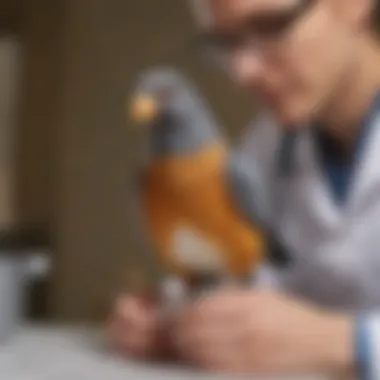
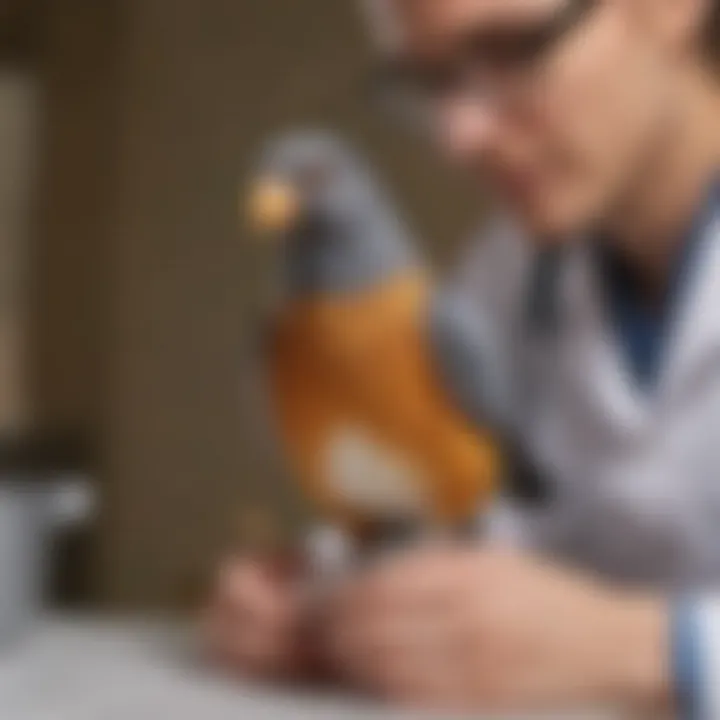
Many owners opt for automatic feeders. These can help keep food fresh while reducing the need for daily pouring. However, renewable options should be considered carefully to allow consistent access to fresh water, as it is critical for your bird.
Types of Feeding Equipment
- Bowls: Easy to clean and sturdy.
- Automatic Feeders: Can provide constant food supply.
- Water Dispensers: Keep water fresh and available.
Perches and Toys
Birds are highly intelligent creatures, requiring enrichment for mental and physical stimulation. Perches of various materials offer comfort and promote foot health. Serious consideration of texture is important; rough perches help in wearing down claws while offering naturalistic conditions.
When selecting toys, look for ones that encourage play. Rotating toys can keep them interested. Avoid those containing unsafe materials or small parts that can be swallowed or choked upon. Proper toys not only prevent boredom but can also aid in behavioral management issues.
Grooming and Health Supplies
Just like any pet, birds require proper care and grooming to thrive. Essential grooming supplies include nail clippers, specific bird grooming perch options, and beak trimmers. Birds use their beaks and claws often, making regular maintenance necessary.
Additionally, you must ensure health supplies are readily available. A basic first aid kit might contain necessary creams and antiseptic solutions, however, routine veterinary checkups help maintain long-term health. Not every expense can be anticipated; hence creating a range for unexpected needs is prudent.
Remember, a well-equipped bird home contributes not only to the comfort of your pet bird but also reflects the commitment of the owner. Proper supplies provides the foundation for a thriving avian relationship.
By carefully considering all these supply needs—cages, feeding tools, interactive items, and health care essentials—owners lay the groundwork for fulfilling the greater financial promise of bird ownership.
Recurring Monthly Costs
When considering the financial obligations of pet bird ownership, recurring monthly costs become a central focus. These expenses persist throughout the bird's life and can significantly impact your budget. Understanding these costs is essential not only for managing expectations but also for ensuring the bird's well-being. If left overlooked, ongoing costs can surprise new owners, leading to stressful financial situations and even making the decision to rehome the pet inevitable.
Food Expenses
Food is one of the most significant ongoing expenses in bird ownership. Birds need a balanced diet to maintain their health, which includes high-quality seeds, pellets, and fresh fruits and vegetables. The specific needs vary based on the bird species and can be more costly for larger species that eat more.
Regular purchases of bird food can range widely but here are some key considerations:
- Quality Matters: Opting for high-quality brands can enhance the bird's health, possibly reducing long-term veterinary costs. Low-cost food might lead to deficiencies that could result in health complications.
- Bulk Buying: Consider purchasing in bulk to mitigate expenses over time. Large bags would typically present better pricing per ounce, however, storing foods correctly is essential to preventing spoilage.
- Variety: Offering different kinds of food fosters mental stimulation. This could entail longer-term costs as you manage and rotate supplies regularly.
Routine Veterinary Care
Routine veterinary care is another recurring expense, often crucial for a bird’s longevity. Scheduling regular check-ups helps catch issues early and maintain the bird’s overall health. These visits often include:
- Annual check-up costs: Depending on the veterinarian, prices can vary, but usually include a physical exam along with necessary screenings. Prices typically start around €50 and can go higher.
- Vaccinations: Certain species require vaccinations, which add to annual expense. These prices change based on treatment and local vet prices.
- Parasite control: Monitoring parasites is essential due to their impact on health. The treatments may happen intermittently, contributing to regular costs.
Exam and preventative care should not be overlooked if you want to keep your pet healthy long-term.
Maintenance of Housing and Supplies
Finally, maintenance of the bird's environment and equipment also comes with its own monthly costs. Regular upkeep ensures a safe and comfortable living situation. Be attentive to the following:
- Avian Cages: Depending on wear and tear, servants of space can necessitate cleaning or possibly replacement after certain years depending on your bird’s habits. Neglect can lead to harmful build-up of bacteria, motivating you to clean weekly.
- Toys and Accessories: Birds are playful and need stimulation to prevent boredom-related behaviors. Planning budget for toys either monthly or quarterly is very common in bird ownership.
- Grooming Products: These might include nail clippers or bathing opportunities, tailored for convenience and comfort, ensuring health and hygiene.
In short, regular upkeep provides safety and comfort, avoiding erratic large expenses.
Unexpected Costs of Bird Ownership
Understanding the unexpectedly high financial responsibilities that emerge after adopting a pet bird is crucial for prospective bird owners. While initial costs can be relatively straightforward to outline, the surprises that may arise later can significantly impact one’s wallet and peace of mind. The reality is that pet birds, like any animals, can present unanticipated situations that require immediate financial attention. It is always best to plan for these so that the joy of having a bird companion does not become a heavy burden.
Medical Emergencies
Medical emergencies can occur at any time, and birds can be particularly susceptible to injuries and illnesses. Their small size can often make them more vulnerable. Common emergencies might arise from accidents such as falls or unexpected illnesses caused by stress or changes in their environment. As a bird owner, keeping an emergency fund available for just such circumstances is essential. The costs associated with veterinary visits can range significantly, often reaching hundreds or even thousands of dollars.
Caring for a pet bird may require more vet visits than anticipated. Regular health-checks combined with potential treatments for unexpected conditions = lead to cumulative costs that can grow rapidly. Here are some financial aspects to keep in mind:
- Routine inspections typically range from $50 to $150.
- Emergency visits may skyrocket to between $100 and $300 depending on location.
- Specialized avian care, if required, can escalate costs even further.
"Preparing financially for unexpected emergencies allows owners to ensure their bird receives appropriate care without significant stress."
Crisis prevention through regular checkups can ease potential emergency costs. Proactive bird ownership can save health challenges that lead to costly emergencies.
Replacement of Damaged Items
Another hidden cost to think about is the replacement of items after an accident or damage. Birds are naturally curious creatures. They often chew on furniture, cables, or even items that seem safe. This behavior can lead to damage that might go beyond simple wear and tear. Understanding that replacement expenses of such items adds complexity to ownership will help you navigate such unforeseen costs.
Some potential replacements might include:
- Cages: If damaged, a new cage can cost from $100 to several hundred dollars.
- Toys: Birds require stimulation, making toys essential. If destroyed, expenses can add up quickly.
- Accidental damage to home items can result in repair or replacement costs, leading to financial implications that are often overlooked prior to cockatiel ownership.
Overall, planning for potential emergency costs and replacements cultivates a more secure financial approach to owning a pet bird. Exercising foresight can ensure a more remarkable ownership experience and create an atmosphere where both you and your bird can thrive.
Cost Comparison Between Bird Species
Understanding the cost difference between various bird species is crucial for potential bird owners. Different species come with distinct price tags due to their availability, popularity, and care needs. Knowledge about these differences assists in making informed decisions that align finances with the responsibility of bird ownership.
Smaller Birds (e.
g., Budgies, Finches)
Smaller birds like Budgies and Finches are often more affordable than their larger counterparts. Prices for these birds generally start around $20 to $100 depending on the species and where you buy them. Their basic care needs are also more straightforward.
- Initial Cost: A Budgie can run you as little as $30 to $50 at pet stores or breeders.
- Maintenance Costs: Over time, expenses can include food (averaging about $10 monthly), cage maintenance, and toys or accessories.
The smaller size of these birds offers smaller habitation spaces and fewer supplies, making them ideal for first-time bird owners. However, do remember that they need companionship, so consider adopting a pair.
Medium Birds (e.
g., Cockatiels, Conures)
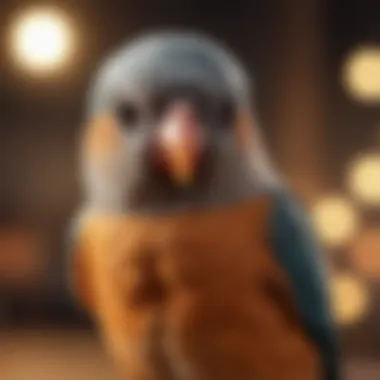
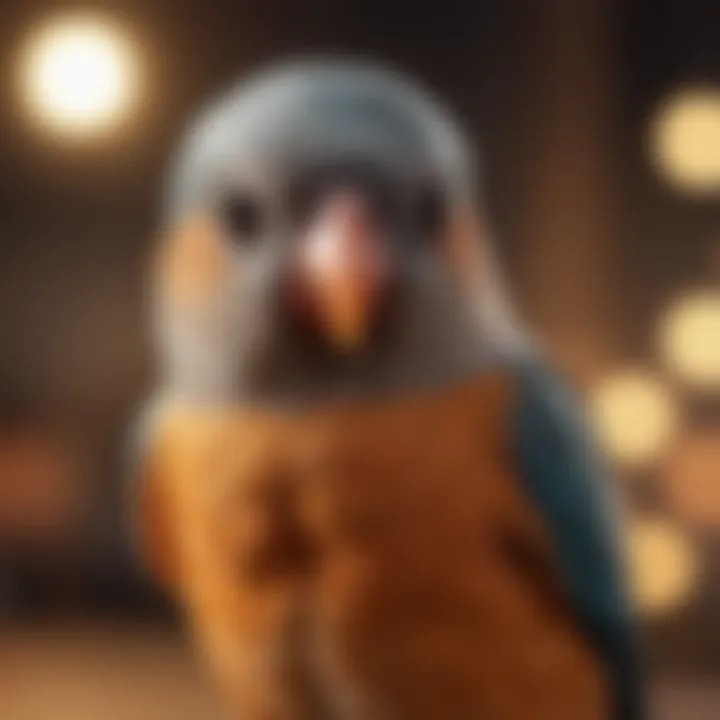
Medium birds present a contrast regarding cost and care. Cockatiels might range from $50 to $150, while Conures can cost between $150 and $500. Both species are social and tend to require more engaging toys and space.
- Longevity: Long-term, their average food costs increase, reaching around $20 to $30 per month.
- Equipment Needs: Along with their food, veterinary care costs typically begin duty at $100 annually.
Their playful natures make them delightful companions, but it’s essential to assess your budget realistically before making such a choice.
Larger Birds (e.
g., Parrots, Macaws)
If you are drawn to larger species like Parrots or Macaws, be prepared for a significant financial commitment. Prices for these birds can range from $500 to several thousand dollars, particularly for exotic breeds.
- Initial Investment: A standard African Grey may cost between $1,000 and $3,000 based only on age and breeding conditions.
- Ongoing Costs: Food and enrichment monthly expenses could reach $50 to even $100 dollars for varied diets, and then veterinary visits can easily exceed $200 annually.
The transport and housing space requirements also increase. Sizeable aviaries can be expensive. Prospective owners must weigh financial goals carefully and ensure that a commitment aligns with the lifestyle they aim to maintain.
Key Considerations: Different species bring different costs and care needs. It is vital to assess if you are ready to provide for them long-term, as one misplaced decision can affect your life and the bird's well-being.
Budgeting for a Pet Bird
Budgeting for a pet bird is an essential step for any potential owner. Understanding the various financial elements reduces the chances of facing unforeseen expenses. When you accurately budget, you ensure that you are prepared for the daily needs of your avian companion and scale back on potentially harmful financial stressors that could jeopardize your bird's well-being.
a. A well-structured financial plan transforms bird ownership from a sudden decision into a well-considered commitment. You can track both regular expenses and unexpected costs by creating a budget. This preparation has direct benefits: you will likely have a clearer understanding of what you can afford in terms of food, vet care, and necessary supplies.
b. Planning provides a sense of control over your pet’s care and your financial health. Moreover, when you account for all the factors associated with pet bird ownership, you will be prepared for anything, allowing for a happier and healthier environment for both you and your new feathered friend.
Creating a Financial Plan
Creating a financial plan is the first step in effective budgeting. It involves listing all potential costs associated with pet bird ownership, identifying areas where you will need to spend, and estimating how much you need to save each month.
- Initial Costs: This includes the purchase price of the bird, cage, and other essential set-up expenses.
- Ongoing Expenses: Factor in monthly costs for food and bedding as well as regular vet visits. Knowing what to expect helps you segregate that money away into savings right from the start.
- Miscellaneous Expenses: Make room for unexpected costs. Need new toys, a vet checkup, or emergency medical care? Keeping a role for miscellaneous expenses ensures that these do not become burdensome.
When creating a financial plan, be thorough and realistic in assessing your expenses. Allocate funds accordingly and review your financial standing regularly. Adjustments will likely be necessary, but having a comprehensive financial outline depends on attentive monitoring of your actual expenses versus your anticipated budget.
Emergency Fund Considerations
Having an emergency fund is vital in your budgeting efforts. An emergency fund acts as a safety net, especially in unexpected situations involving your bird’s health. Expenses can add up rapidly, particularly during medical emergencies.
- Vet Visits: Health issues can arise unexpectedly. Funds available for these emergencies ensure prompt care for your bird, adding to its well-being.
- Supplies Replacement: An essential item like a cage that breaks need replacement or repair. Don't underestimate transport expenses and additional products required for a sudden situation.
It is recommended to build a cushion of at least three to six months' worth of costs into your emergency fund. This balance or coverage offers a variety of protections.
The need for an emergency fund is not merely about saving; it's about investing in the care and lives of your beloved pet. Without this, you potentially delay critical medical attention. A pet's health can depend on timely intervention.
Both the financial plan and the emergency fund approach represent more than simple monetary calculations. They reflect a commitment to responsible pet ownership and show that you genuinely consider the long-term relationship with your bird.
Long-term Financial Commitment
Understanding the long-term financial commitment of owning a pet bird is crucial for any prospective bird owner. It's not merely about the initial purchase price or the immediate care requirements, but also about the realities of ongoing and future expenses that accumulate over time. By grasping these aspects, potential owners can prepare adequately for the unique needs of their feathered companions.
The lifetime of a bird can range significantly based on the species and individual care. Thus, the costs extend well beyond food and essentials. Unlike cats or dogs, some birds have remarkably long life spans, sometimes living for several decades. This necessitates a framework for expenses that are not only immediate but are sustainable over many years.
Key considerations for long-term bird ownership include healthcare, which should ideally encapsulate routine vet visits and emergency care. Furthermore, the eventual need for retraining, replacement of worn-out supplies, and potential upgrades in housing must be accounted for. Birds can exhibit changes in behavior as they age, which may also affect their needs. To use an example, a playful young budgie may grow into a wise elder that requires more suited environmental elements and activity adaptations.
Finally, budgeting tools can help owners logically approach these financial responsibilities. Some find value in maintaining a log of all costs related to pet ownership, spanning from simple toys to major medical care events. In sum, the long-term financial commitment is not only about understanding the basic economics of bird ownership; it’s about creating a safeguard of knowledge and funds to ensure that every need of the pet is met with ease.
Lifetime Costs of Bird Ownership
Owning a pet bird involves a complex set of financial obligations that mature over the life of the animal. Potential Owners should include initial outlays, including acquisition, 😂venter setup, dietary needs, and ongoing care for long-term valuations.
- Initial Set Up:
- Ongoing Expenses:
- Emergency Fund:
Accidents can happen leading us — potentially extravagant unplanned expenses. Owning a diverse bird that faces potential needs (medical emergencies) contributes significantly to overall expences.
- Cage and purchase price of the bird.
- Accessories like toys, dishes, and perches.
- Safety measures to enhance their environment.
- %Monthly food cost, often depending on the type of bird.
- Monthly vet treatments, including routine checkups.
- Costly procedures may arise unexpectedly.
Bird ownership is akin to a long-term investment, requiring mindful attention to not only immediate needs but the accumulating volcano of future costs.
Budgeting significantly involves isolating mandatory budgets and additional special treasury to allow indulgence in recreational aspects of bird care. It vastly revolves upon thorough comprehensions of needs based not only on present behavioral characteristics but on what should be expected during later life stages.
Planning for Aging Birds
Discussions around pet ownership often circle around the blissful years of young birds. However, as the feathered companions approach maturity, owners need to adjust planning accordingly. This thought process allows people preparing for financial stability and fulfills as acts of responsibilty towards their avian liberties.
- Understanding Aging Needs:
- Health Monitoring:
Ethical rearing often leads to conversations surrounding veterinary perspectives. Planning becomes significantly critical to ascertain regular appointments or treatments arc prepared well ahead. - Space Considerations:
- Dietary changes become imperative for their old age as their gustatory needs might alter, dictating expenses focused towards specializing nutrition proportional to equals their health behaviors.
- The condition of housing incorporates renovations breaking eventual thythm for possibly geriatric limitations.
Efficiency in planning paired succinctly with commitment qualifies this enrichuldness fosters immersive accessibility. Daffodil growing aura capacity could bloom for optimized beautiful heart arrangements around investing intentions for society renewed.blockqoute>
Epilogue
Owning a pet bird is not just about the delightful companionship it offers; it involves ongoing costs that can escalate over time and fluctuate based on various factors including health, species, and lifestyle.
The focus on budgeting methods and emergency funds helps reinforce the idea that planning is essential. For those venturing into bird ownership, grasping the comprehensive picture enables informed choices, which ultimately enhances the lifespan and welfare of their pet.
By synthesising all that has been discussed,
it becomes evident that being financially prepared contributes to a healthier environment for birds, ensuring they receive adequate care, nutrition, and medical attention, well into their golden years.
Investing time to assess the realities of bird ownership precludes potential hardships related to unforeseen costs and financial strain. Consider the bigger picture of their lifetime commitment.
In summary, this conclusion demonstrates the importance of understanding financial commitments, which serves as a foundation for responsible pet bird ownership.
Key Takeaways
- Initial and Recurring Costs: Budgets should factor initial purchase prices, housing supplies, food needs, and routine veterinary visits.
- Unexpected Expenses: It's crucial to set aside funds for emergencies, which can arise suddenly, especially in terms of health-related issues.
- Species Variation: Different bird species present varying needs and cost structures, thus understanding this is vital for any potential bird parent.
- Long-term Planning: Preparing for a pet bird extends beyond finances; it encompasses partially their expected lifespan and care complexity.
Mastering these takeaways can provide future bird owners with the skills necessary to foster a healthy life for their new avian companion.













